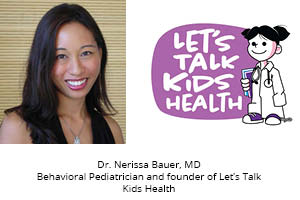ADHD & Anxiety
 ADHD and anxiety often co-exist and sometimes it can be challenging to distinguish between the two. We spoke to leading pediatrician and founder of Let’s Talk Kids Health, Dr. Nerissa Bauer, to shed some light on these two conditions.
ADHD and anxiety often co-exist and sometimes it can be challenging to distinguish between the two. We spoke to leading pediatrician and founder of Let’s Talk Kids Health, Dr. Nerissa Bauer, to shed some light on these two conditions.
Disclaimer: the information contained on this website does not constitute medical advice. If you have concerns about your own health or the health of someone else, you should speak to your doctor.
Why is it common that children with ADHD also have anxiety?
Well, we need to backtrack a little. In children, any behavioral or mental health diagnosis is tricky. This is because we rely on what we see outwardly and, as of now, there is no definitive blood test or imaging study that can be done for a diagnosis for ADHD or anxiety.
When parents come to seek a diagnosis for ADHD, they will typically report outward symptoms. A lot of times those symptoms can look like either ADHD or anxiety, especially the inattentive form of ADHD (I’ll talk more about the different types of ADHD later). So when a parent says their child is distracted, making careless mistakes, it looks like they’re daydreaming – It raises the question – is this ADHD, is this anxiety or is it both?
How else can symptoms of ADHD resemble anxiety?
There are two components of anxiety, not just the thinking and ruminating about upcoming future events. There is a physiological response. For example, it can make people really fidgety, angry or moody because they don’t like such feelings and they don’t know how to handle negative emotions.
With either of these presentations, you can think of the kid who is anxious and worrying about an upcoming test for example. And thinking things like ‘I don’t want to be called on because I might mess up’. They look like kids who are inattentive and have ADHD. But kids that are hyper-aroused because they want to flee from imminent danger can also be fidgety.
That is why I caution parents when there is a concern of behavior issue, either by a teacher, or at home. We really need to do due diligence and gain an understanding from both parents and teachers. In addition, we need to be taking into account observations that are made in the clinic and from teacher’s reporting of peer interactions, because we don’t want to just jump to a label.
Any advice for parents and teachers dealing with ADHD and anxiety?
When a teacher or parent notices a child who is very fidgety or very impulsive, it is important to first look and compare the child to other children (in the class). It is also important to ask what is going on in this child’s life? We know that a child’s behavior can be reflective, not just in terms of what is going on internally, but it can also be affected by the child’s environment. Kids spend a lot of time at home and school, so parents and teachers share the opportunity to observe.
I would say that parents who are concerned should be partnering with the teacher to understand their child’s behaviors and then bring on board the child’s doctor to further investigate potential underlying causes for the behavior. it’s important to first look and compare to other children the same age and in the same setting
Which treatments are available for ADHD and/or anxiety?
It’s important that upon receiving a diagnosis of ADHD, anxiety or both, that we don’t automatically assume medication is the first-line treatment. Sometimes, medication is needed to improve the child’s overall functioning; however, in the treatment of mental health and behavioral issues, a combination approach including behavioral therapy, is often more effective than just medication alone. Your child’s pediatrician can determine whether parenting and educational supports are also required to further round out the treatment plan.
Cognitive Behavioral Therapy (CBT) is an evidence-based modality that helps a child with anxiety learn tools to cope. It can also be applied to helping children with ADHD with poor emotional control and goal-directed behavior. Strategies that improve executive functioning so children can learn life skills to organize, plan, execute multi-step and in-depth projects, sustain attention and monitor their own progress are critical life skills. When children are taught these types of strategies they can learn to manage and perhaps one day be able to do what they need to do without medication.
Parenting support can be beneficial to help improve interactions a parent has with their child. It also helps ensure consistency between caregivers. These programs cover topics such as providing positive attention to your child, praise and tangible rewards, limit setting, consequences and time out. It also helps parents develop appropriate expectations of their child based on their age and temperament. Parents learn which strategies to use and when.
